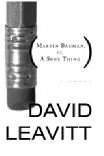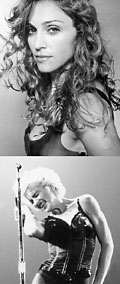AS A COLLEGE UNDERGRAD in the 1980s, Martin Bauman pines for the New York literary life, the mystique of which clings to his writing teacher, Stanley Flint. Bauman reflects, “Tall and limping, with wild dark hair and a careful, gray-edged beard, [Flint] carried a whiff of New York into the room, a scent of steam rising through subway grates which made me shudder with longing.” A hard-boiled critic with a Midas-like ability to transform students into authors, Flint views Bauman in a less flattering light. Not long after a classmate describes Bauman as “ready to pounce on a sure thing,” Flint expounds for his pupil: “I’m sorry to say it, but it’s easy for me to imagine you turning into a hack, settling for cheap success, and not because you’re greedy, but because you desire too desperately to please.'”
Martin Bauman; or, A Sure Thing by David Leavitt (Houghton Mifflin, $26)
Such characterizations cause the reader to expect—or hope—that David Leavitt’s Martin Bauman; or, A Sure Thing will chart Martin’s climb up New York’s literary ladder. To some degree, the novel does just that. Still in college, Bauman publishes a “homosexual story” in “the magazine,” a publication that “provoked both veneration and fear, as in those religious sects that perceive God’s name as too holy to bear utterance.” In turn, the story launches Bauman’s career in letters, landing the insecure, fresh-out-of-the-closet aspirant smack in the middle of America’s publishing capital, where he—through a combination of fortune and dubious intentions—acquires essential connections, attends literary soir饳, publishes a debut novel, associates with a “literary brat pack,” and partners up with fellow writer Eli Aronson for a long-term relationship.
While Bauman rises, New York sinks. Formerly viewed by the young writer as “that mysterious and enviable universe,” the city degenerates into a “squabbly, small-town society which for all its aspirations to worldliness finally resembled, more than anything else, one of those cottage-y Devon villages of which E.F. Benson wrote.” Likewise, rather than hone his talents or engage in “intellectual exchange,” Bauman participates in less elevated activities, like the “New York art of flattery” and reading books in the fashion of literary Manhattanites who, “before even turning to a novel’s opening page, will first examine the author’s photograph, check the back cover to see which other writers have given him blurbs, look at the dedication, scan the acknowledgements . . . and finally skim the small print on the copyright page, whereon are listed the names of those magazines in which a portion of the book in question . . . has previously been published.”
DAVID LEAVITT IS Martin Bauman—in some respects. Just as Bauman the narrator looks back over 20 years at the exploits of his younger self, so Leavitt uses this novel to do the same. As the author states in an interview with his publisher, “Martin represents an exaggeration of David.” Before graduating from Yale in the early ’80s, Leavitt sold the first-ever gay-related short story to The New Yorker; soon thereafter, at age 23, he published a collection, Family Dancing, which confirmed his place among a group of much-hyped up-and-coming authors whose youth and restlessness energized Reagan-era literary New York.
Truth or fiction, the seemingly more autobiographical elements of the novel—Bauman’s epic love affair with Aronson, the lovers’ sweet-and-sour relationship with the closeted writer Liz Perlman, Bauman’s encounters with the AIDS epidemic—detract from the earlier focus on Bauman’s ambitions. What should have served as marginal details surrounding the exquisitely written, seductive story of one hopeful’s literary ascension become large-scale, meandering interruptions, in turn leaving the reader not so sure just what Martin Bauman; or, A Sure Thing is about.








